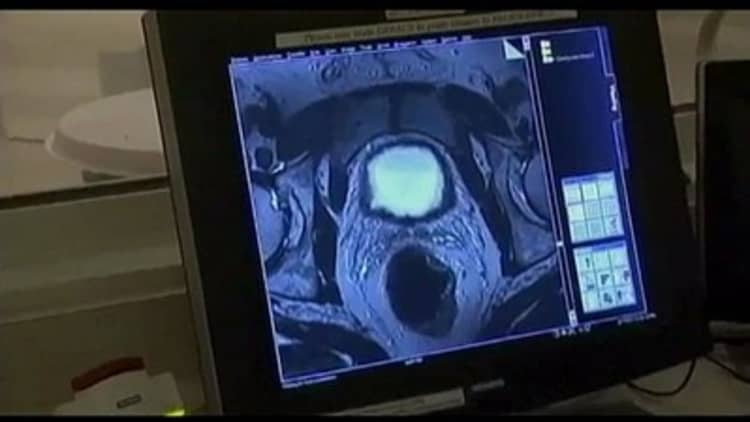
If you're a man between ages 55 to 69, one aspect of your medical care may have just gotten a little more confusing.
The U.S. Preventive Services Task Force, an independent and influential panel of experts, published new guidelines Tuesday for screening for prostate cancer for the first time in five years. It changes a 2012 recommendation that one urologist described as "a public health nightmare."
The new recommendations: Men ages 55 to 69 should "make an individualized decision about prostate cancer screening with their clinician." That's updated from a blanket recommendation in 2012 for no routine screening at any age.
The task force made the recommendation, which is still in draft form as it seeks public comment, after determining that the potential benefits and harms of the prostate-specific antigen test are closely balanced in men ages 55 to 69. Those older than 70 shouldn't undergo PSA screening, the task force said.
"Prostate cancer is one of the most common cancers to affect men, and the decision about whether to begin screening using PSA-based testing is complex," Dr. Alex H. Krist, a member of the task force and associate professor of family medicine and population health at Virginia Commonwealth University, said in a statement.
Some experts think the 2012 guidance was a clear mistake.
"We've been jumping up and down about this for years and years," Dr. Benjamin Davies, an associate professor of urology at the University of Pittsburgh School of Medicine, told CNBC. The 2012 guidelines, he said, "were horrible."
Davies says the recommendations not to screen for prostate cancer likely resulted in deaths that could have been avoided. Prostate cancer is the most common cancer in American men; the American Cancer Society projects more than 161,000 new cases this year in the U.S., with about 26,730 deaths.
More from Modern Medicine:
The race is on to stop a Zika virus epidemic in the US
The land of the Vikings may hold the cure for cancer
Could flashing light treat Alzheimer's? Fresh approaches to treating the disease
The PSA test is a simple blood test that determines levels of the prostate-specific antigen protein, and elevated PSA can be a sign of prostate cancer. But elevated PSA can also be caused by other conditions, like inflammation of the prostate or enlarged prostate.
The risk of potential harm of over-diagnosis has led to confusing recommendations for screening. Treatment for prostate cancer, including removal of the prostate and radiation, is associated with incontinence and erectile dysfunction.
False positives can lead to unnecessary further testing or treatment, and many cases of prostate cancer are slow-moving and require watchful waiting rather than immediate treatment.
"For men who are more willing to accept the potential harms, screening may be the right choice for them," Krist continued. "Men who are more interested in avoiding the potential harms may choose not to be screened. In the end, men who are considering screening deserve to be aware of what the science says, so they can make the best choice for themselves, together with their doctor."
The 2012 guidelines resulted in a precipitous decline in screening, according to an analysis published March 30 in the New England Journal of Medicine. From 2010 to 2013, screening rates among men in their 50s dropped from 33.2 percent to 24.8 percent, and in those ages 60 to 74, from 51.2 percent to 43.6 percent.

In turn, this led to a major decline in reported incidence of prostate cancer, of 20 percent between 2011 and 2012, and another 6 percent from 2012 to 2013, according to the authors, Paul F. Pinsky, Philip C. Prorok and Barnett S. Kramer.
So how useful is PSA screening? According to the New England Journal analysis, studies imply that 1 prostate cancer death is averted per 1,000 men screened several times each, and followed for 10 to 15 years.
On the flip side, the authors reported, data show about 35 over-diagnosed cases per 1,000 men screened.
Some groups are at higher risk for prostate cancer, including African-American men and those with a family history of the disease. The task force said research on prostate cancer in African-American men "should be a national priority."
With the update in recommendations, the dispute over PSA testing is likely to continue. The recommendations say nothing about men under 55, for whom some groups do recommend screening in some circumstances. Actor Ben Stiller last year divulged that he was diagnosed with prostate cancer after receiving a "baseline" PSA test at age 46, crediting the test with saving his life.
For now, the task force's recommendation? Talk with your doctor.




